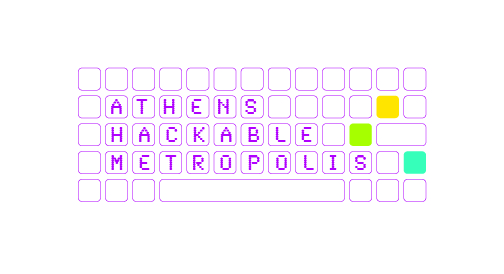We are in Athens from May 5-7 2014 organizing a workshop together with our friends from the National and Kapodistrian University of Athens and the Hybrid City Conferences, as part of our research into Hackable Cities.
Workshop Athens Hackable Metropolis
Faculty of Communication and Media studies / National and Kapodistrian University of Athens
Department of Media Studies / University of Amsterdam
The Mobile City
Athens, May 5-7 2014
Background
Digital media provide people with tools to organize themselves around collective issues, mobilize publics and manage social and infrastructural resources in collaborative ways. This occurs in multiple domains, from energy production to the organization of healthcare, from the management of public housing schemes to the appropriation of the urban public sphere. At least those are the promises of digital media technologies and the ‘participatory society’. And so far a number of bottom-up smart citizen initiatives have indeed blossomed in many cities worldwide. These usually consist of networked people who engage in issues like neighborhood livability, community building, energy provisioning, sharing resources and measuring and generating environmental data. Often they employ sensor technologies, or utilize digital media to organize themselves around a common issue. The generation, publication, visualization and analysis of (open) data usually plays a crucial element in these initiatives.
At the same time city municipalities worldwide have embarked on smart city policies, together with tech businesses and knowledge institutions. They deploy digital technologies and big data – often generated in closed systems – to optimize services like traffic, energy, environment, governance and health.
These developments challenge existing routines of ‘city making’, the ways in which governmental institutions, (urban) design professionals and citizens call their city into being through processes of top down planning and management together with bottom-up appropriation and social organization. Urban design professionals, tech businesses, governmental institutions and citizens are forced to rethink their stakes and roles.
However, so far the worlds of smart city and smart citizens rarely interact, opportunities are wasted to combine capacities of various stakeholders in city making with digital technologies. This project’s research agenda tries to combine these approaches by exploring the future of city making with digital media with the notion of the ‘hackable metropolis’.
What is a Hackable Metropolis?
By ‘hackable’ metropolis we mean a city that opens its institutional workings and is open to systemic change initiated by its citizens. A hackable city functions as a platform that can be appropriated and incrementally improved upon by various stakeholders. For example, an energy grid may be designed technically and legally to treat citizens not just as consumers but to allow them to appropriate the grid cooperatively as energy producers. Another example is that institutional parties who generate and collect data about the city share them in an ‘open source’ way (free to use and reuse), which enables designers and citizens to create innovative applications based on these data.
This workshop revolves around the question of how city making may include citizens as active change agents by becoming ‘hackable’. From this main question a number of sub-questions are derived. What can we learn by porting the notion of hackability, which is derived from the world of digital technologies, to city making? What does this concept teach us about self-organization, open innovation, do-it-yourself ethics, accessibility, participation, legal matters, and so on? How can professional skills and expert knowledge be coupled with citizen interests? How can the often impromptu and fleeting character of bottom-up movements be reconciled with more robust long-term visions on urban development? How can small-scale, bottom-up social initiatives complement often top-down and closed smart city approaches? How can private parties and public institutions provide conditional frameworks and procedural directives that allow others to become involved in their activities? Can designers and institutions help in scaling up these initiatives and make them easier to replicate? From a political point of view, how do these often parochial initiatives match with democratic decisions and the public interest? And from the point of view of urban culture and identity, how does this hackable city shape the ways in which urbanites in all their differences relate to their environment, to other people, and ultimately to themselves?
A special focus will be applied to the role of data. How is data produced, labeled, shared and operated upon in the hackable city? How can aggregation of urban data give insight into particular issues, or put them on the agenda? How can it be visualized in such a way that a larger public is engaged with the issue? How can it be offered in such a way that the visualization or the dataset itself becomes ‘actionable’? What conditions need to be met with regard to (open) data sets for them to be of value? And what is the role and responsibility of stakeholders such as local governments, infrastructure providers and citizens in the production and availability of these data? Is merely providing access enough, or do governments need to be an active agent in the process in which this data is made intelligible?
Workshop Goal
Develop a prototpye for ‘hackable city making’ that addresses a pressing issue in Athens. How can we make this issue ‘hackable? (A combination of) various phases can be addressed:
- what data could be aggregated / assembled / is already there that could give insight into the issue?
- How could the issue be visualized / communicated?
- How can a public be engaged around the issue?
- How can the public become aware of itself?
- How can the public ideate solutions?
- What tools are there to act upon the issue / manage it in a collective way?
- How can a particular solution be scaled-up / replicated?
The end product is a ‘paper (or screen based) prototype’. You don’t need to build an actual software platform, but provide sketches of what you would like to build and be able to explain how it could work. What is the driving design principle of your prototype and how does that connect with the central societal issue it is addressing? What could the interface look like? How is the issue communicated? How is the public made visible? How can it act?
Proposed Locations / Issues
Housing complex at Alexandras Str.
The recent news on the concession of the Housing Complex at Alexandras Str to the Asset Development Fund have revived the issue of their vacancy and future use. The complex has been declared a monument since 2009 and in the light of the upcoming elections, every party put forward their own ideas on the future of these housing buildings. Could there be a process through which the current inhabitants and involved stakeholders can negotiate and reach a common agreement on the fate of these buildings?
SynAthina
SynAthina is a platform, created by the Municipality of Athens to map and connect citizen’s initiatives in the city center. The platform is connected to a physical meeting point on Athinas Str. oppossite of Varvakeios Market. How can the platform improve its function and become accessible from a wider audience. How can the municipality ensure transparency and address issues of suspicion and lack of trust from the part of the citizens?
Rethink Athens
A large architectural competition proposing the pedestrianization of Panepistimiou Str. has sparked a fierce debate over the necessity of this project, both as a contribution to the gentrification of the city center and as an unnecessary expenditure during the crisis. There is also a debate over the role of private initiates in big urban interventions and the sincerity of their intentions. What would be a public debating tool open to all citizens of Athens, where people with different expertise and levels of involvement can compose a more complete impression of the implications of such a radical intervention?
Embros Theater
Originally hosting the printing house of Embros newspaper, the building was rented to director Tasos Mpantis in 1989 and became the base of his theater group till 2007. In 2011 the building, which is also a monument, was occupied and activated by the artist-activist group Kinisi Mavili with the support of the neighborhood association of Psyrri inhabitants. There are currently several cultural programs taking place in the building. How can the groups involved at Embros make use of new media to communicate their activities, advocate for the value of their programs and legitimize their presence against attempted expulsion?
Program
Day 1 Monday May 5th
15:30 – 17:00
Introduction lectures Cristina Ampatzidou & Martijn de Waal and discussion: what is a hackable city? How can we design hackable city prototypes?
Introduction locations (SynAthina, Rethink Athens, Housing complex on Alexandras Str., Empros Theater)
Formation of Workgroup teams
17:00 – 21:00
Phase 1: Research & first ideation phase.
Online Research: learn more about the place / issue / and its stakeholders.
Field work: explore your location (mapping / what data is available or could be collected? / photography).
At the end of the day you should have an idea about what issue you would like to tackle and have some background information about your case, and a first idea for an intervention. What issue did you select? How can you visualize this issue, and make it engaging for which public? What do you need to work these ideas out?
Day 2 Tuesday May 6th
15:30 – 16:30
Group presentations: Every group should present in 10 minutes the results of yesterday’s research. What is the central issue? What are your first thoughts (or conflicts) about how it can be made into a hackable city-prototype?
17:00 – 21:00
Design Phase 2: Choose one or more of the 7 phases from the Hackable City-model that you want to address in your prototype, and start developing a first prototype.
Day 3 Wednesday May 7th
15:30 – 16:00
Communal Discussion on ‘hackable city making’. Each group briefly gives an update about their prototypes and the process they went through. What design issues have come up, and how have you addressed them?
16:00 – 19:00
Design phase 3: further develop prototype + presentation
19:00 – 21:00
Presentations of the final prototype:
Each group has 10-15 minutes to present their prototype by means of a visual presentation (powerpoint / keynote / video / photos / sketches / etc). The presentation should briefly define the issue and illustrate a possible ‘hackable city’ way to address it.
Background Literature
Aurigi, Alessandro. 2012. “Reflections towards an Agenda for Urban-Designing the Digital City.” URBAN DESIGN International 18 (2): 131–44. doi:10.1057/udi.2012.32. http://www.palgrave-journals.com/doifinder/10.1057/udi.2012.32.
Concilio, Grazia. “LIVING LABS MODELS FOR CO-DESIGNING IN URBAN AND PUBLIC SPACE.”
Friedrich, Authors Pirjo. 2013. “Boundary Conditions for Successful Urban Living Labs”, 1–24.
Powell, a. 2012. “Democratizing Production through Open Source Knowledge: From Open Software to Open Hardware.” Media, Culture & Society 34 (August): 691–708. doi:10.1177/0163443712449497. http://mcs.sagepub.com/cgi/doi/10.1177/0163443712449497.
Seltzer, E., and D. Mahmoudi. 2012. “Citizen Participation, Open Innovation, and Crowdsourcing: Challenges and Opportunities for Planning.” Journal of Planning Literature 28 (1): 3–18. doi:10.1177/0885412212469112. http://jpl.sagepub.com/cgi/doi/10.1177/0885412212469112.
Vervoort, Joost M., Kasper Kok, Ron van Lammeren, and Tom Veldkamp. 2010. “Stepping into Futures: Exploring the Potential of Interactive Media for Participatory Scenarios on Social-Ecological Systems.” Futures 42 (August). Elsevier Ltd: 604–16. doi:10.1016/j.futures.2010.04.031. http://linkinghub.elsevier.com/retrieve/pii/S0016328710000789.
Waal, de Martijn “Introduction” The City as Interface (Rotterdam: NAI010 Publishers, 2014) http://www.thecityasinterface.com
Inspiration for Prototypes
See
Social Cities of Tomorrow workshop conducted in Amsterdam, 2012
the Real-Time City workshop conducted at TU Delft in 2013
Contact
Martijn de Waal martijn@martijndewaal.nl
Amsterdam Hackable Metrpolis (AHM) is an ‘embeded researcher’ project funded by Circa, and initiated by One Architecture, The Mobile City Foundation and the University of Amsterdam.
Project leader: Martijn de Waal
Project Partners: Matthijs Bouw (One Architecture), Michiel de Lange (The Mobile City)
Embedded Researcher: Cristina Ampatzidou.
Hackable City Athens is partially funded as part of an ERASMUS staff exchange program.
The Athens Hackable Metropolis workshop was organized together with the Cristina Ampatzidou, Iouliani Theona, Dimitris Charitos and Daphne Dragona at the Faculty of Communication and Media Studies, University of Athens.


